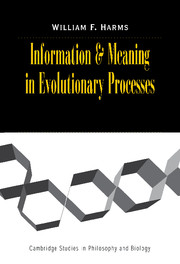Book contents
- Frontmatter
- Contents
- Acknowledgments
- Introduction
- PART I GENERALIZING EVOLUTIONARY THEORY
- PART II MODELING INFORMATION FLOW IN EVOLUTIONARY PROCESSES
- 3 Population Dynamics
- 4 Information Theory
- 5 Selection as an Information-Transfer Process
- 6 Multilevel Information Transfer
- 7 Information in Internal States
- PART III MEANING CONVENTIONS AND NORMATIVITY
- Epilogue: Paley's Watch and Other Stories
- Notes
- Appendix: Proof of Information Gain under Frequency-Independent Discrete Replicator Dynamics for Population of n Types
- References
- Index
4 - Information Theory
Published online by Cambridge University Press: 28 July 2009
- Frontmatter
- Contents
- Acknowledgments
- Introduction
- PART I GENERALIZING EVOLUTIONARY THEORY
- PART II MODELING INFORMATION FLOW IN EVOLUTIONARY PROCESSES
- 3 Population Dynamics
- 4 Information Theory
- 5 Selection as an Information-Transfer Process
- 6 Multilevel Information Transfer
- 7 Information in Internal States
- PART III MEANING CONVENTIONS AND NORMATIVITY
- Epilogue: Paley's Watch and Other Stories
- Notes
- Appendix: Proof of Information Gain under Frequency-Independent Discrete Replicator Dynamics for Population of n Types
- References
- Index
Summary
One thing that is missing from the formal framework for evolutionary analysis is a principled way of assessing the global-tracking efficiency of a knowledge system independently of the payoffs that drive its evolution. The purpose of this chapter is to propose a measure of mutual information borrowed from communications theory as an appropriate tool for measuring tracking efficiency, which is intended to complement and augment teleosemantics (see Part III of this book), standard evolutionary game theoretic formalisms, and Godfrey-Smith's (1991, 1996) application of signal-detection theory. It is important to note at the outset that the use of information suggested herein is different from the use that Dretske (1981) attempted to make of it in naturalizing meaning. In what follows, I begin with an introduction to information tailored to the needs of evolutionary epistemology. I then present reasons why this concept of information is appropriate, address worries regarding the metaphysical commitments entailed by its adoption, discuss briefly the attempt to use information theory to naturalize meaning by Dretske, and conduct preliminary investigations into the relationship between mutual information and payoffs in simple optimization processes. I close with a discussion of various concepts of information and their relation to the information of information theory.
INFORMATION BASICS
Although any thorough account of the history of information theory (also known as “communication theory”) begins with the seminal contributions of Nyquist (1924) and Hartley (1928), things really got off the ground with Claude Shannon's (1948) “A Mathematical Theory of Communication.”
- Type
- Chapter
- Information
- Information and Meaning in Evolutionary Processes , pp. 109 - 132Publisher: Cambridge University PressPrint publication year: 2004

